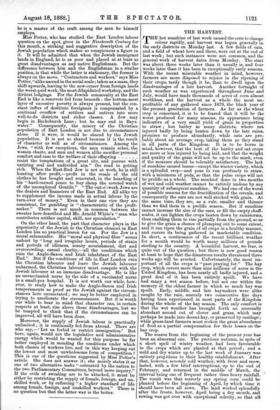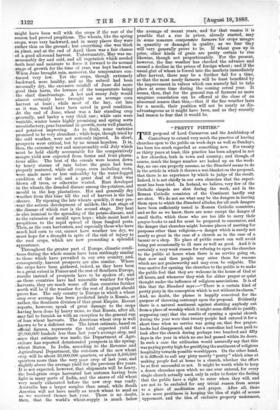nth HARVEST.
TIThot sunshine of last week caused the corn to change. 3olour rapidly, and harvest was begun generally in. the early districts on Monday last. A few fields of oats, and a field of wheat here and there, were cut at the end of last week ; but such instances were not common, and the general work of harvest dates from Monday. The start was about three weeks later than it usually is, and four weeks later than it has been in exceptionally early seasons. With the recent miserable weather in mind, however, farmers are more disposed to rejoice in the ripening of their crops, tardy though it be, than to dwell upon the disadvantages of a late harvest. Another fortnight of such weather as was experienced throughout June and July, would have made thousands of acres of corn almost worthless, and the harvest as a whole the most un- profitable of any gathered since 1879, the black year of the present generation of farmers. As far as the wheat crop is concerned, it is to be feared that it will be the worst produced for many seasons, its appearance being indicative of a very small yield of grain in proportion to straw but barley many districts, where not injured badly i by being beaten down by the late rains, promises to produce abundantly, while oats are pro- bably about an average crop, taking them as they stand in all parts of the Kingdom. It is to be borne in mind., however, that the best of the barley and oat crops are more or less injured by being laid, and that the weight and quality of the grain will not be up to the mark, even. if the measure should be tolerably satisfactory. The lack of sunshine caused beans—except the winter variety, which is a splendid crop—and peas to run profusely to straw, with a minimum of pods, so that the pulse crops will not be prolific as a whole. The mischief done in two months of wet and cold weather cannot be entirely undone by any quantity of subsequent sunshine. We had one of the worst of possible seasons for the fructification of the cereals, and consequently the ears are not well stocked with grain. At the same time, they are, as a rule, smaller and thinner than we find them in a prolific season. But if sunshine cannot increase the size of the ears, or fill the empty chaff- scales, it can lighten the crops beaten down by rainstorms, thus enabling them to rise partially from the ground, so an to give the grain a chance of plumping out to some extent, and it can ripen the grain of all crops in a healthy manner, and ensure its being gathered in marketable condition. In short, a continuance of the recent brilliant weather for a month would be worth many millions of pounds sterling to the country. A bountiful harvest, we fear, is. quite out of the question ; but there is now good reason at least to hope that the disastrous results threatened three weeks ago will be averted. Unfortunately, the most important of all the crops is "past praying for." The hay crop, which covers more than nine millions of acres in the United Kingdom, has been nearly all badly injured, and a. great deal of it has been entirely spoilt. We have had many a wet season before, but not one within the memory of the oldest farmer in which so much hay was spoilt. Early, middle, and late haymakers were alike caught by the rain, scarcely two consecutive fine days having been experienced in most parts of the Kingdom during the whole of the hay season. The only comfort is that the wet weather has brought forth an unusually abundant second cut of clover and grass, which may perhaps be made into decent hay, or preserved by ensilage ; while grass-land farmers must reckon the great abundance of feed as a partial compensation for their losses on the hay crop. The season from the beginning of the present year has been an abnormal one. The previous autumn, in spite of a short spell of wintry weather, had been favourable to the crops which are planted at that period ; and a. mild and dry winter up to the last week of January was entirely propitious to their healthy establishment. After that, however, severely cold weather, with frost and snow, lasted, with a few brief interruptions, up to the end of February, and returned in the middle of March, the , interval being one of frequent rather than heavy rainfall The result was that scarcely any spring corn could be planted before the beginning of April, by which time it should have been all sown. The land worked splendidly after the frosts, however, April being a dry month, and sowing was got over with exceptional celerity, so that aB might have been well with the crops if the rest of the season had proved propitious. The wheats, like the spring crops, were very backward, and in many places they were rather thin on the ground; but everything else was thick in plant, and at the end of April there was a fair chance of a good all-round harvest. Unfortunately, May was un- seasonably dry and cold, and all vegetation which needed both heat and moisture to force it forward to its normal stage of growth for the time of year, was kept backward. When June brought rain, moreover, the temperature con- tinued very low. Yet the crops, though extremely backward, were healthy, and as the subsoil had been unusually dry, the excessive rainfall of June did more good than harm, the lowness of the temperature being the chief disadvantage. A hot and sunny July would .almost certainly have brought us an average corn harvest at least ; while most of the hay, cut late as it was, would have been saved in good condition. At the end of June, wheat was a fair standing crop . generally, and barley a very thick one ; while oats were variable, winter beans highly promising and spring sorts unsatisfactory, peas luxuriant in growth, roots well planted, and potatoes improving. As to fruit, some varieties promised to be very abundant ; while hops, though tried by the cold weather, were not seriously injured. In short, prospects were critical, but by no means hopeless. It is, then, the extremely wet and unseasonably cold July which must be held chiefly accountable for the comparatively meagre yield now expected from farms and fruit planta- ..tions alike. The best of the cereals were beaten down • by heavy storms of rain before the grain had been . properly matured, while all crops, even including roots, were made more or less unhealthy by the water-logged condition of the soil, and a great deal of fruit was blown off trees, or otherwise wasted. Rust developed • in the wheats, the dreaded disease among the potatoes, and mould in the hop plantations. Hot and generally dry weather from this time till the end of harvest is the last chance. By ripening the late wheats quickly, it may pre- vent the serious development of mildew, the last stage of the disease of which rust is the second stage. Dry heat As also inimical to the spreading of the potato-disease, and to the extension of mould upon hops ; while moist heat is propitious to the rapid spread of these fungoid pests. ,.Then, as the corn harvesters, and especially those who have . much laid corn to cut, cannot have weather too dry, we . must hope for a drought in spite of the risk of injury to the root crops, which are now presenting a splendid appearance.
Throughout the greater part of Europe, climatic condi- tions during the whole season have been strikingly similar to those which have prevailed in our own country, and, _consequently, harvest prospects are also similar Where the crops have been gathered, indeed, as they have been . to a great extent in France and the rest of Southern Europe, °results instead of prospects have to be spoken of; and .,as those countries have had miserable weather for their harvests, they are much worse off than countries further north will be if the weather for the rest of August should prove fine. The only country in Europe in which a wheat crop over average has been predicted lately is Russia, or rather, the Southern division of that great Empire. Recent reports, however, speak of great damage to the crops -having been done by heavy rains, be that Russia, after all, may fail to furnish us with an exception to the, general run of lean wheat harvests. The American wheat crop is well known to be a deficient one. The latest estimate, based on official figures, represents the total expected yield at 29,000,000 bushels less than last year's average crop, and :since that estimate was made, the -Department of Agri- culture has reported deteriorated prospects in the spring- !wheat States. In India, according to the Revenue and Agricultural Department, the out-turn of the new wheat crop will be about 33,000,000 quarters, or about 3,500,000 quarters more than the very poor crop of last year, and slightly above the average yield for the previous five years. It is not expected, however, that shipments will be heavy, the food-gram crops harvested last autumn having been light in many parts of India, and the stores of old wheat very nearly exhausted before the new crop was ready. Australia has a larger surplus than usual, while South America will not have nearly as much wheat to send us as we received thence last year. There is no doubt, _then, that the world's wheat-supply is much below the average of recent years, and for that reason it is possible that a rise in prices, already started, may in some measure compensate farmers for crops meagre in quantity or damaged in quality, as we fear they will very generally. prove to be. If wheat goes up in price, other kinds of grain are pretty certain to rise likewise, though not proportionately. For the present, however, the fine weather has checked the advance and caused a. decline in the prices of foreign wheat ; and if the usual glut of wheat is forced into the markets immediately after harvest, there may be a further fall for a time, so that the most needy farmers will be least benefited by the improvement in values which can scarcely fail to take place at some time during the coming cereal year. It seems, then, that for the general run of farmers no more sanguine consolation can be offered at the close of an abnormal season than this,—that if the fine weather lasts for a month, their position will not be nearly as dis- advantageous as it might have been, and as they recently had reason to fear that it would be.



































 Previous page
Previous page